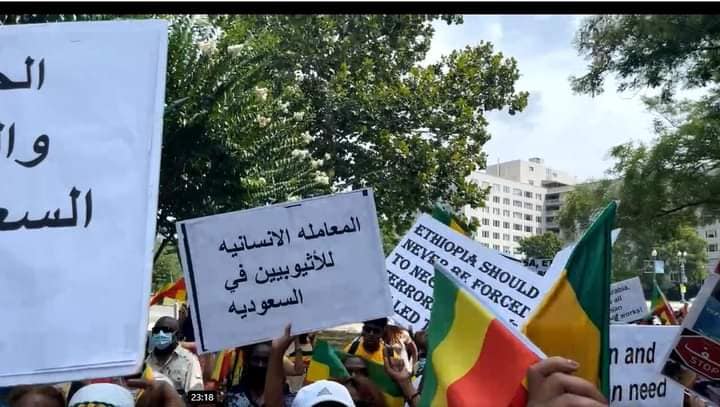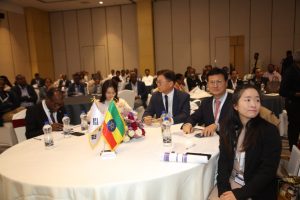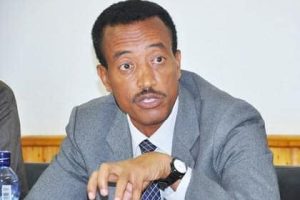
BY STAFF REPORTER
Without exaggeration Ethiopians in the diaspora are making a historical level of struggle in delivering all the necessary contribution required by their home land. For instance, their major recent contributions include raising funding to support major local development endeavor like the construction of the Grand Ethiopian Renaissance Dam, rehabilitation of compatriots displaced by the sporadic conflicts in various corners, voicing their objections of unfair external pressure against their country, among others.
All these efforts of the diaspora community boil in to the concept of supporting the local efforts of nation building. The issue of nation building, especially post conflict nation building is a vital issue that needs active participation of the diaspora community of any given nation throughout the world.
Currently Ethiopia is also found at a decisive historical juncture that needs the concerted efforts of the government, people at home and the diaspora. In addition to the high level development projects that the government is executing, the country is contending an unprecedented level of external pressure against its sovereign rights and interests. Hence, the developmental and peace building efforts of the diaspora community comes here handy.
Diaspora contributions to development and peace building take many shapes, with variations occurring in who acts, how, doing what, why and where. Contributions are often made by individuals – for example, through the sending of remittances to family members – but may also be done collectively, such as when diaspora organizations implement projects in the country of origin, for instance improving access to water, healthcare or education.
The activities engaged in can be both direct and indirect. Direct transnational engagements occur when diaspora individuals or groups send money, goods or ideas to their country of origin directly. Indirect transnational engagements occur when diaspora individuals or groups urge others, including European governmental and nongovernmental actors, to undertake activities of benefit to the country of origin.
Transnational contributions can furthermore involve material, financial and in-kind contributions, as well as social capital – the last, among the diaspora who contribute virtually, through electronic communication and the provision of online learning opportunities.
Another important element is that diaspora engagement takes place not only from the country of settlement but also through (temporary) return. A number of characteristics may combine together frequently: diaspora organizations, for example, are collective actors that largely function on a voluntary basis, and human capital may best be transferred through (temporary) return. But, in principle, examples of any combination of these characteristics can be found.
Considering the wide variety and high level of diaspora engagements with development and peace building, it is not surprising there is great interest in the topic among European governmental and nongovernmental actors. There are a number of reasons for this interest, which relate to remittances, return, resources, recognition and reputation, and we will address each of these in turn.
State building in an environment of post crisis and/ or post conflict requires urgent measures in the national reconstruction, rehabilitation and economic growth process. Moreover, it is now commonly agreed the African fragile states will need an enormous effort to improve their social and economic growth indicators to be able to contribute to the Millennium Development Goals (MDGs) by 2015 and beyond. In this context, the post crisis and post conflict states are commonly affected by: (i) high expectations from the citizens for services delivery; (ii) high expectations from donor partners to put in place transparent and accountability frameworks; and (iii) little or no available human capacity to deliver on these broad agendas.
State building in an environment of post crisis and/ or post conflict requires urgent measures in the national reconstruction, rehabilitation and economic growth process. It is against this backdrop, that African governments are increasingly recognizing the importance of their citizens abroad or the ‟new African Diaspora‟ in national and regional development.
In light of the fact that the Diaspora can play an important role in recovery and reconstruction of fragile states, the present study aims to elaborate on the available experiences both regionally and globally; drawing lessons from country experiences in involving Diaspora in building domestic institutional capacity; and to inform Bank assistance in implementing national frameworks aimed at strengthening governance, reconstruction and sustainable development.
Concomitant with a calling into question of the brain drain thesis, in the past decade considerable attention has been given to the ways in which diaspora populations can and do impact the development of their homelands from their overseas locations. Whether construed as selfless patriotism and paternalism or self-promoting meddling, it is clear that at key moments in the past diaspora communities have assumed responsibilities normally held by — and in so doing challenged the autonomy of — sending states. At times, they have acted to infantilize institutions in their homelands. More recently, however, there has been growing recognition that diaspora contributions can play a more progressive and supportive role in helping sending countries to help themselves. This book subscribes to the view that at least some diaspora communities have the potential to play a positive role in the empowerment of institutions in sending states, and thereafter to undergird the emergence of these states as capable and self-determining architects of their own futures. The purpose of the book has been to map, conceptualize, scrutinize, and critique the wide variety of ways in which countries’ talent abroad mobilizes and acts to transform, improve, scale up, and fortify the capacity of public, private, and civil institutions at home.
Chronicling how diaspora groupings impact domestic institutions immediately begets a follow-up question: is it possible to proactively build and create opportunities for, design, finance, and growth of diaspora-homeland projects and, if so, how might policymakers best intervene? Many countries now believe that such interventions are not only possible, but also necessary and advantageous, and have pioneered a new area of public policy often referred to as diaspora strategy.
While most commonly championed by poorer countries, including Argentina, Armenia, China, Chile, El Salvador, Ghana, India, Jamaica, Mexico, Morocco, Nigeria, South Africa, and Tunisia, diaspora strategies have also been pursued by comparably more advanced nations, such as Australia, Ireland, Israel, New Zealand, and Scotland. A wide range of diaspora strategies and associated diaspora schemes (institutions, instruments, policies, programs, and initiatives) have already been conceived and implemented. Moreover, many countries are now participating in a global dialogue and through joint policy transfer workshops, seminars, publications, toolkit manuals, and conferences, are identifying best practices and swapping and adapting schemes.
While some view this turn to diaspora as a mere extension of existing approaches to development, others view diaspora-centered development as a fundamental departure from existing practice. According to Thomas Faist, for instance, prior emphasis upon either state-led development (examples include the former command economies of Eastern Europe, the developmental states of Southeast Asia, and China) or market-led development (e.g. the neoliberal economic strategies pursued in the western capitalist world and some states in the developing world) has given way to a new commitment to community-led or civil society-led development in which the concept of social capital has come to occupy more central ground.
In this context, diaspora constituencies are being positioned by sending states as significant brokers of global economic competitiveness. The objective of the development industry now is to activate and mobilize diaspora agents as enablers of national development projects. In due course, a full audit of the philosophical shifts implied in, and the forms of development promoted by, diaspora-centered development will be required, including who benefits from such development, where, why, and how.
THE ETHIOPIAN HERALD JULY 27/2021





